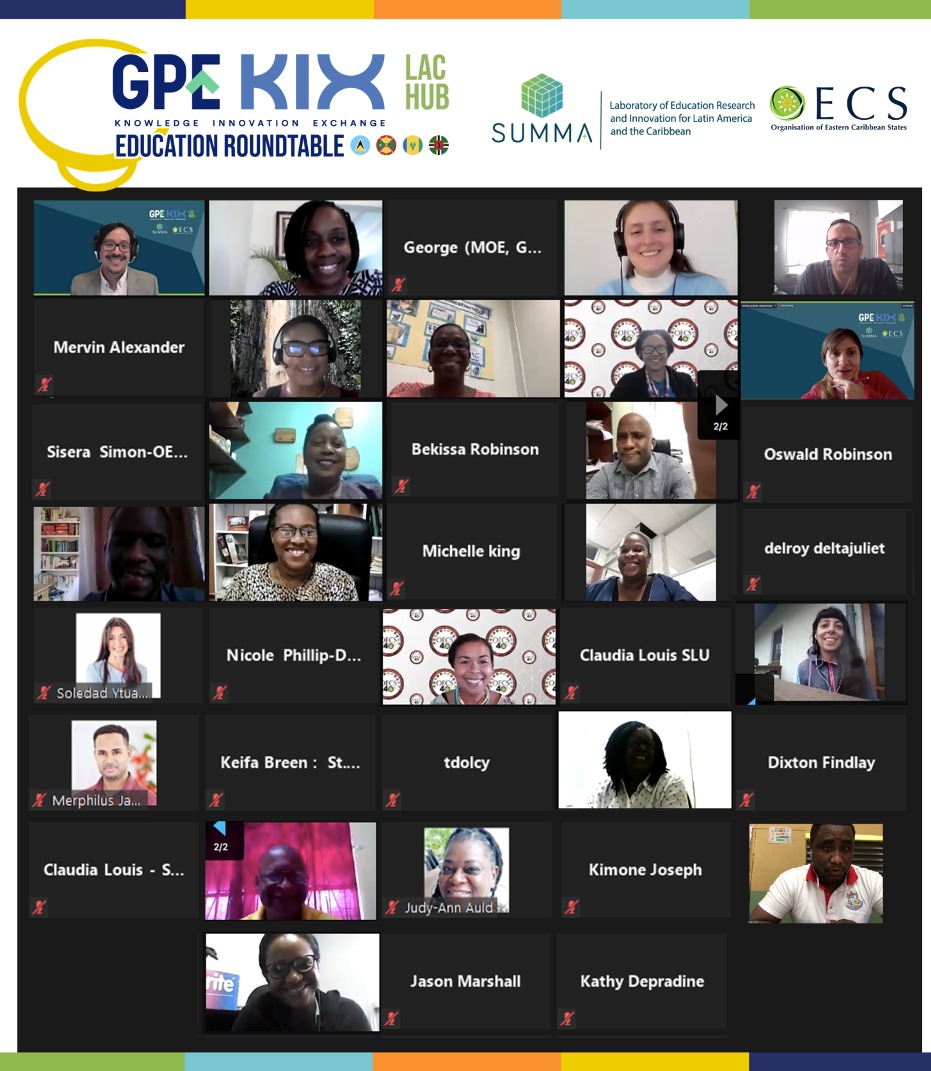COMPARTIR
Education roundtable on the challenges and opportunities in the Eastern Caribbean countries
July 14, 2021
OECS members in working group.
SUMMA and OECS held the fourth working group on education with representatives from the Caribbean countries that make up the KIX center in Latin America and the Caribbean: Dominica, Grenada, St. Lucia and St. Vincent and the Grenadines, a meeting where national studies conducted by Dr. Verna Knight and her team of researchers from the University of the West Indies for KIX LAC were presented, which highlight the needs and current educational challenges, as well as evidence-based recommendations that can strengthen educational provisions and, by extension, the experiences of individual learners.
The meeting began with a thank you from the Knowledge Innovation Exchange KIX program specialist at IDRC, Florencio Ceballos, where he valued the importance of building the work together and hearing first-hand the priorities of the sector through its representatives. For his part, Raul Chacon, director of the KIX LAC Project, emphasized that “we need to synergize efforts and build on the strengths and experiences of each of the countries, so that we can contribute to the improvement of the education sector in this Caribbean region”.
According to the reports, the challenges and negative effects generated from Covid-19 significantly affected education in the Caribbean, mainly the deepening inequality in access to technology, the lack of pedagogical and technical preparation for teachers to continue working online, the loss of instructional time and the poor Internet connectivity in the homes of most students.
Based on the data obtained during the studies and interviews with the main actors and representatives of education in the four countries, the authors made suggestions to continue the drive by governments and organizations involved to ensure that every student has access to technology, using different communication channels (e.g. radio, television, etc.) to reach the students who have the most connectivity problems.
______________________
Specifically, the reports concluded that in Dominica, COVID-19 has changed the face of education in the Caribbean. More than 12,337 students and more than 1,178 teachers were affected by the disruption caused by the pandemic. Many parents were also affected, some of whom were left jobless because of the pandemic.
Grenada continues to grapple with the twin challenges of maintaining the policy of universal access to secondary education and improving the quality of education in all sectors of the education system. Given that low educational attainment is one of the identified factors impacting high levels of unemployment, the current disruptions to schooling caused by the ongoing COVID-19 pandemic pose an additional risk. There is a clear need for increased support to increase access to post-secondary education and training, and to university level studies in general.
Ministry of Education data indicates that over 24,035 students (pre-school, primary, secondary and tertiary levels) in Grenada were affected by the initial school closures between March and September 2020. A Ministry survey showed that 63% of students in the tri-island state were unable to access classes during the initial school closure period.
In St. Lucia, there is an urgent need to complete the review of all policies to ensure inclusion and equity, as well as to further train teachers and education officials in the integration of ICT in education. and equip teachers and students with electronic devices suitable for blended or online learning.
And in St. Vincent and the Grenadines, more than 28,000 students and over 2,000 teachers continue to experience educational disruption caused by the pandemic, exacerbating problems of Internet access and lack of technological training for teachers and students.
Although the Vincentian government has maintained its commitment to improving education, there are still significant challenges to be addressed, including the quality of early childhood education, reading skills, lack of human and financial resources to effectively monitor and evaluate policy, and the need for more research to inform policy direction decision making.
